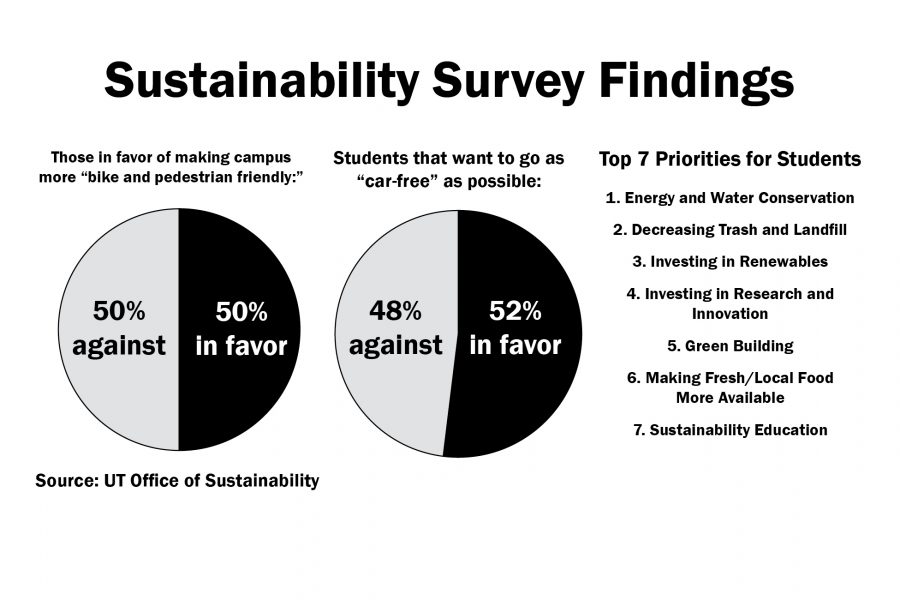Results from a campus-wide survey show that students, faculty and staff largely agree sustainability should be a high priority at UT over the next 15 years.
The survey was open through the end of October in order to collect input from the UT community for a UT Sustainability Master Plan, which will be in effect for 15 years after it is published.
Director of Sustainability Jim Walker said 3,000 people answered the survey, and their answers will be used to shape the
Master Plan.
“The first ever UT Austin Sustainability Master Plan will use the diverse responses from the poll, the experience of our own students, staff and faculty, as well as feedback from many in-person meetings around campus, to help us shape practical strategies designed to build on our strong foundation and the widespread existing consensus about future priorities,” Walker said in an email.
According to survey findings, there is broad consensus within the UT community regarding eight sustainability categories.
More than 70 percent of the surveyed UT community thinks energy conservation, water conservation, investing in renewables, investing in research innovation and trash and landfill reduction should be high priorities. More than 60 percent of the community indicated increasing the availability of fresh and local food, sustainability education and green building should also be high priorities.
Daniela Pachon, environmental science sophomore and a zero waste assistant at the Campus Environmental Center, said she thinks the survey shows students’ efforts to be more sustainable and hopes education is the main aspect that comes to fruition in the Master Plan.
“We know what recycling is, we know what renewable resources are, we know what water conservation is, but a lot of people — just out of fear of how big and broad the topic is — are misinformed about a lot of things and thats not a bad thing, it’s totally normal,” Pachon said. “It’s a two way thing. It’s one, us getting the thing we need to become sustainable and also the people putting in their effort to adopt that kind of lifestyle.”
Integrative biology graduate Elise Worchel said she went to one of the forums about the UT Sustainability Master Plan held before the survey was sent to UT students and said she was not surprised so many students felt water conservation should be a top priority for the Master Plan.
“It seems that water conservation is a big thing that campus is going to move forward on, especially after this survey,” Worchel said. “I know they talked a lot about having assistance for rainwater collection.”
The sustainability survey also found that 50 percent of those who took the survey think UT should be more bike and pedestrian friendly and 48 percent want the campus to be as “car-free” as possible. Although community input is being taken highly into consideration, Walker said making UT “car-free” is not a realistic strategy due to local transit limitations.
Over the next few months, staff will be working on the outlines of the first UT Sustainability Master Plan, which is estimated to be completed by April 2016, Walker said.
“We want to make sure that UT-Austin is a leader over the next fifteen years in innovative and affordable solutions that make a positive impact,” Walker said in an email. “When the plan comes out next spring, you will see just how seriously we take your feedback.”





















